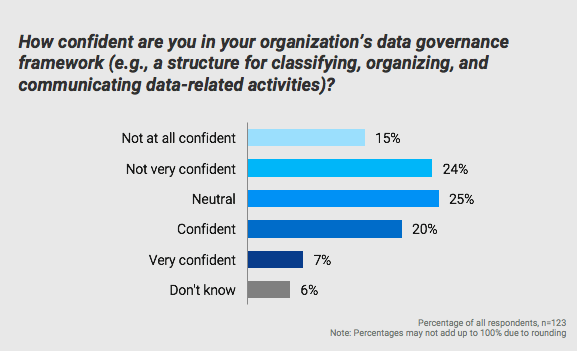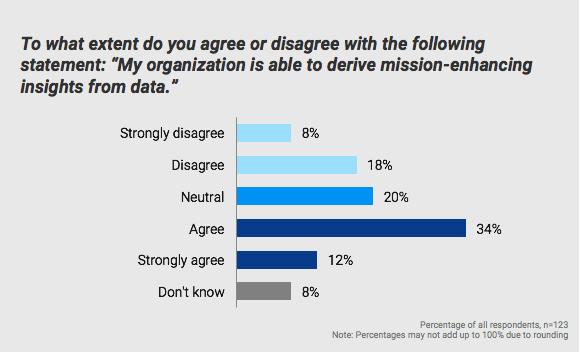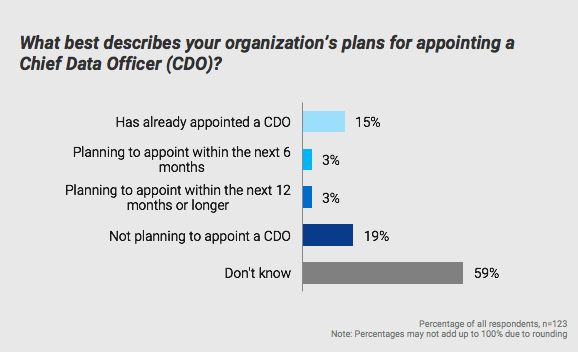sponsor content What's this?

Flash Poll Series: Building a Big Data Culture
Data is the future of government — but many organizations are still at the beginning of implementing a data governance framework.
Presented by
Cloudera

FINDING #1: Nearly 40% of respondents lack confidence in their organization’s data governance.
The public sector is trekking through uncharted territory: unprecedented quantities of data are being produced at stunning rates, and while all this information has the potential to radically enhance decision-making, many government agencies are still in the early stages of envisioning and executing a data governance framework. In order to take full advantage of collected data, organizations needs to establish a strategy that enables data to be shared across the enterprise ― according to industry leader Cloudera, comprehensive data governance contributes directly to the success of big data projects, allows agencies to effectively leverage “data lakes” and other enterprise content, and broadly expands their ability to fulfill core functions. To learn more about how government is managing and utilizing data, Cloudera fielded a series of flash polls in September 2017. 123 employees from federal, state, and local government responded to the following question:

A plurality of respondents (39%) are not at all or not very confident in their organization's data governance framework, a quarter of respondents are neutral, and 27% are confident or very confident
In a digital era defined by ever-increasing cyber threats, organizations must implement rigorous standards to preserve data integrity while enabling collaboration. However, according to these findings, organizations still have room for improvement when it comes to data protection.
Frameworks such as the Cloudera SDX― a suite of tools required by enterprise data services to build and run high-value, multi-function analytics on-premises and in public and private cloud environments ― make Cloudera an essential partner for achieving effective governance. This shared data experience includes a common data catalog data upon which consistent security, governance, and management functions can be leveraged for both long-running and transient analytics applications. Self-service access to business data is made possible without having to recreate the context and controls for each new use case.
FINDING #2: Nearly half of respondents feel that their organization is able to derive mission-enhancing insights from data.
Mission success is increasingly dependent on an organization’s ability to harness the power of data analytics. However, while government agencies have been expanding their capabilities in recent years, many are still at the beginning of their big data journey. Technological and bureaucratic hurdles such as continued dependence on legacy solutions, a complex regulatory environment, and resistance to open data exchange contribute to difficulties implementing data initiatives across departments.
In light of these challenges, GBC and Cloudera released the following poll:

The picture painted by the survey results is somewhat encouraging ― nearly half of respondents (46%) believe their organization is able to derive mission-enhancing insights from data, versus 26% who feel the opposite. However, the fact that more than a quarter of individuals are skeptical of their organization’s ability to effectively leverage data is indicative of room for improvement in government’s current big data toolkit.
Cloudera and other cutting-edge innovators are working with the public sector to address these issues. With targeted solutions like Cloudera Enterprise with Cloudera SDX, Cloudera is uniquely poised to augment government data analytics, help agencies meet their internal storage and management needs, and meaningfully impact the constituent services they deliver. By expanding existing capabilities, Cloudera’s tools and expertise allow government organizations to move away from data chaos and toward continuous improvement and optimization.
FINDING #3: More than half of government employees do not know their organization’s plans for appointing a Chief Data Officer (CDO).
As mentioned previously, an agency’s cultural approach to data is of equal importance to the resources it spends on modernizing IT; according to former Chief Data Scientist DJ Patil, workforce mindset is fundamental to data strategy optimization, which can be accomplished through direct organizational change. This idea is gaining traction across the federal government — a recent piece of legislation would require, among other data initiatives, organizations to appoint chief data officers and chief evaluation officers.
In light of this, Cloudera and GBC asked government employees to describe their organization’s plans for appointing a Chief Data Officer (CDO):

Just 15% of respondents indicate that their organization has already appointed a CDO, and nearly 20% say that their organization has no plans to appoint a CDO. Moreover, a sizeable majority (59%) don’t know whether their organization has any plans in place.
Agencies have a clear incentive to appoint CDOs (or similar positions) as soon as possible ― industry leaders like Cloudera have already highlighted the connection between leadership buy-in and jump-starting a successful analytics/data governance framework. In addition to the “start small, fail often” mantra ubiquitous throughout technology sectors, Cloudera notes that it is equally important to promulgate a culture centered on cutting-edge solutions.
Integral to this effort is the notion that employees should take a big data approach to analysis and thoughtfully compile teams of experts best suited to convert cultural norms into practical results. By providing concrete mechanisms that facilitate change, Cloudera empowers organizations to successfully manage the ‘human factor’ in their data journey.
This content is made possible by our sponsor. The editorial staff of Government Executive was not involved in its preparation.






